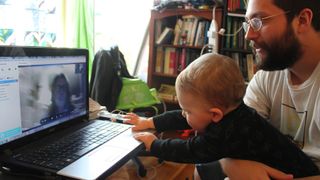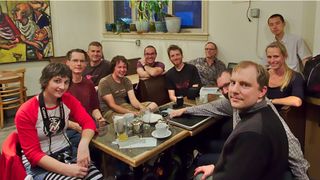Never lonely again: can tech stop us feeling empty inside?
The connection between technology and loneliness is complicated

Forget smoking cigarettes or stuffing your face with bacon – one of the biggest avoidable killers is loneliness. Don’t take our word for it: one study found that loneliness can increase the risk of premature death by up to 30%.
The world is more connected than ever before, and yet more and more of us feel isolated. In the US, more than one-fifth of the population say they’re lonely.
Can technology help – or is it part of the problem? Are we lonely because of technology, or despite it? The answer is like a Facebook relationship status: it’s complicated.
- Do you have a brilliant idea for the next great tech innovation? Enter our Tech Innovation for the Future competition and you could win up to £10,000!
The sadness of social media
Newspapers may have exaggerated the issue for scary headlines, but multiple studies suggest that spending too much time on social media isn’t good for our mental health. Like most technology, it’s not so much the technology itself that's the problem as how we use it.
Writing in Psychology Today, David Ludden Ph.D. notes that there’s a lot of conflicting research. “It’s certainly true that a number of studies have found a connection between social media use and declines in wellbeing,” he says. “But other studies have found opposite results, with people feeling more socially connected as they spend more time on social media.”

Ludden quotes research that identifies two kinds of social media behaviors that seem to be detrimental to our mental health: “social snacking”, where you browse through profiles and comments without engaging, something that wastes time you could be spending talking to others, and self-comparison: forgetting that that celebrity Instagram pic that's making you feel inadequate is the only good one out of 200 other shots, and is the work of 32 make-up artists, a lighting technician and the world’s most expensive plastic surgeons.
These issues apply in real life too, but social media amplifies them: where previously you might compare yourself to the people in your school or workplace, now you can make yourself feel bad by comparing yourself with people from all over the world and their impossibly glamorous, friend-filled lives. But technology doesn’t have to make us feel bad – its ability to connect people can be a powerful force for good.
Get daily insight, inspiration and deals in your inbox
Get the hottest deals available in your inbox plus news, reviews, opinion, analysis and more from the TechRadar team.
Hug your hardware
The Guardian reckons that in the future, you might hug a robot – but its guide to beating loneliness has some more practical tech advice too. It highlights the value of friendship apps such as Meetup, Skout, Excuses To Meet and Hey! Vina, all of which enable us to connect with like-minded people.
It’s not just apps, of course. Social media has been helping people come together since the days of USENET, and today’s website forums and message boards share their DNA with the CompuServe forums and AOL chatrooms from back when the internet was steam-powered. It’s been particularly powerful for minority groups: for example if you’re LGBTQ in a very small town you might not know of any like-minded people locally, but if you go online you’ll find a supportive family of millions.
Whatever your passion, technology enables you to connect with others who share it.
Is Pepper the friendly robot the solution to loneliness? We suspect the answer might be no
Old dogs, new tech
Loneliness is particularly prevalent in older generations. As the assistive technology provider Appello, in conjunction with the Campaign To End Loneliness, reports (PDF), “it is this age group that is most likely to be physically challenged and therefore less likely to leave their homes or socialize freely.” For this group technology could be a real boon, but often it isn’t. The problem isn’t that older people are spending all day comparing themselves to others on Instagram; it’s that many aren’t connected in the first place.
As Appello points out, while apps such as Skype, FaceTime and other video-calling apps “represent the most under-utilized yet readily available, easy to implement and affordable method of communication,” 83% of over-75s never use them. And yet they can be life-affirming.

Janet Morrison is chair of the Campaign To End Loneliness. As she points out, “the impact of technology on loneliness for older people has been hotly disputed, with some arguing that the increasing use of technology has exacerbated the exclusion of older people, while others point to the vital role that technology can play in enabling older people to maintain and develop their social connections”.
As always, it’s how we use the tech that matters. If we’re using FaceTime as a poor substitute for face-to-face visits then clearly that’s a loss; if we’re using it to improve our communications it’s a benefit. As one retirement home resident told Appello’s researchers: “I struggle to get up the stairs to see my friend and I’m hard of hearing, but now I can just video call her to check she is okay and arrange to meet up.”
A help or a hindrance?
In his TED talk, psychologist Guy Winch describes how you can use your everyday technology to escape from the loneliness trap. “If you feel socially disconnected, go through your phone and email address books, and your social media contacts, and make a list of people you haven’t seen or spoken to for a while,” he says.
“If you feel emotionally disconnected, make a list of five people you’ve been close to in the past. Reach out to them and suggest getting together and catching up.” And when you do reach out, be positive: say “Let’s grab a coffee!”, not “You haven’t been in touch for months!”

And of course it’s not just about the people you already know. Technology can also find you the Meetup, the open mic, the dance class, the photography group.
Technology is neither angelic nor infernal; how it affects our lives depends on what we use it for. For example, tech might mean that you work remotely and don’t see anybody all day. But tech can also enable you to connect with other people in similar circumstances, or to find people who share your passion, whether it’s for arts and crafts or artisan beer. If we use technology to enhance our social life, rather than to replace it, we may never need to worry about being lonely again.
TechRadar's Next Up series is brought to you in association with Honor

Contributor
Writer, broadcaster, musician and kitchen gadget obsessive Carrie Marshall (Twitter) has been writing about tech since 1998, contributing sage advice and odd opinions to all kinds of magazines and websites as well as writing more than a dozen books. Her memoir, Carrie Kills A Man, is on sale now. She is the singer in Glaswegian rock band HAVR.
Most Popular


